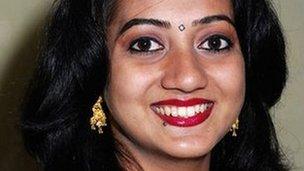How Savita Halappanavar's death called attention to Irish abortion law
- Published

Savita Halappanavar died at the University Hospital in Galway last October
For Praveen Halappanavar the last two weeks have been, in his own understated words, difficult.
Nearly every day, he sat at the back of Galway court house and listened to the details of his wife's last days, and her miscarriage of their 17-week-old female foetus, a much-longed for child.
He briefly wiped a tear from his eye as he gave evidence on the first day and with the permission of the coroner, Dr Ciaran McLoughlin, absented himself on the day the inquest dealt with the post mortem detail of the 31-year-old Indian dentist's death.
Savita's death, a week after her admission to the University Hospital in Galway, once again focussed international attention on the Republic of Ireland's abortion laws.
The cause of death was septic shock, E coli in her bloodstream and a miscarriage at 17 weeks.
Praveen's claim at the time that he was told his wife, despite several requests, could not get an abortion, because "Ireland was a Catholic country", has been vindicated.
A midwife, Ann Maria Burke, admitted at the inquest making the remark, that went around the world, and apologised, saying she did not mean to be hurtful.
She said Savita was in a bad way - the foetus was unviable but there was still a heartbeat - and she was trying to comfort Savita and to explain the position in Ireland on abortion to somebody not from the island.
Ms Burke also noted there had been two referendums on the issue in which she said the Catholic Church was "pressing" the issue.
Since a Supreme Court ruling in 1992, known as the X case, abortion has been constitutionally available in the Republic where a woman's life, as distinct from her health, is at risk from the continued pregnancy.
The credible threat of suicide is - constitutionally - regarded as a grounds for a termination.
But in the intervening years no government has introduced enacting legislation to give doctors legal certainty as to when an abortion can be carried out.
So, there has been a vacuum which the current Fine Gael-Labour coalition government says it will fill with a new law by the summer.
Legislation
That confused picture on abortion was alluded to by one expert witness who addressed the conundrum of where the risk to the health of a pregnant woman becomes a risk to her life.
Dr Peter Boylan, the former master of the National Maternity Hospital in Dublin, told the inquest that Savita would probably still be alive today if she had got a termination in the first three days of her stay in the hospital, but that under Irish law an abortion would have been illegal because there was "not a real and substantial risk to her life at that stage".
And by the time her life was at risk, it was too late to save her with a termination.
The inquest heard of communication failures between medical and nursing staff; evidence was also given of blood test results not being followed up and of pulse rates not taken.
With the inquest over, the focus on abortion in Ireland will move to politics.
Within the next fortnight, the coalition is expected to publish the heads of the bill - its general principles - that it hopes will become law by July.
Fine Gael is the largest partner in the Irish coalition government but several of the party's politicians have expressed unease about the proposal to legislate for the credible threat of suicide as a grounds for a pregnancy termination.
They, and the Catholic Church, believe it could allow for "abortion on demand", something the government strongly denies will happen.
The legislation is expected to be very restrictive by international standards.
Victims of rape, sexual abuse and incest will almost certainly not be entitled to a termination unless their life, as distinct from their health, is at risk.
Nor is it likely mothers, whose foetus cannot survive outside, will be allowed to have an abortion.
In the meantime, more than 11 women leave the Republic every day for a British abortion.
So, while the country has watched fascinated and appalled at developments at Savita's inquest over the past fortnight, 22 of their fellow citizens ended their pregnancies across the water.
The proposed bill is most unlikely to change that statistic.